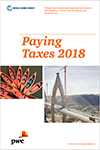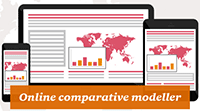Overview
Paying Taxes 2018 a joint annual publication by the World Bank Group and PwC looks at tax regimes in 190 economies and provides an unrivalled global database. This year marks the twelfth year of the publication. The report is based on the Paying Taxes indicator and includes analysis and commentary by the World Bank and PwC. Paying Taxes has historically measured the Total Tax and Contribution Rate (the cost of all taxes borne, as a % of commercial profit), the time needed to comply with the major taxes (profit taxes, labour taxes and mandatory contributions, and consumption taxes), and the number of tax payments. Since last year the study also includes a new sub-indicator – the post-filing index that measures the process of claiming a Value-Added Tax refund and going through a corporate income tax audit. These two processes are based on four components—time to comply with a VAT refund (hours), time to obtain a VAT refund (weeks), time to comply with the correction of an inadvertent corporate income tax error and deal with any resulting tax audit (hours) and the time to complete a corporate income tax audit if required (weeks). The overall Paying Taxes score is based on the four components.
Economies around the world continue to make progress in simplifying and reducing the burden of tax compliance on businesses thanks to the use of technology by businesses and governments. The report finds that the time to comply declined by 5 hours to 240 hours; and the number of payments by one to 24 payments. On the post-filing index, in 81 economies a corporate income tax audit is triggered by taxpayers voluntarily amending a return for a simple error while in 51 of the economies with a VAT system, no VAT refund is available for our case study company, suggesting that there is significant room for improvement in post-filing processes in many economies.
Main Findings
- On average in 2016, it takes the case study company 240 hours to comply with its taxes, it makes 24 payments and has an average Total Tax and Contribution Rate of 40.5%.
- The time and number of payments needed to comply have continued to fall significantly, reflecting the increasing use of technology. Time needed to comply with labour and profit taxes fell by 2 hours (to 61 hours for profit taxes and 87 hours for labour taxes), compared to last year, with labour taxes showing the greatest reduction over the life of the study.
- Electronic filing and payment, improved tax and accounting software and pre-populated returns are amongst the key drivers.
- The Total Tax and Contribution Rate (TTCR) increased by 0.1 percentage points, to 40.5%; with the largest increases resulting from corporate income taxes and turnover taxes.
- In 81 economies, a corporate income tax audit is triggered by taxpayers voluntarily amending a return for a simple error.
- 162 economies have a VAT system, with a VAT refund available to the case study company in 107 economies. There is no VAT refund available in 51 economies, particularly in Latin America and the Caribbean and Sub-Saharan Africa. In four economies, the purchase of an industrial machine is exempted from VAT.
- For those economies where a VAT refund is available, on average it takes the case study company 18.4 hours to comply with the necessary administration, and 27.8 weeks to receive the refund.
- The EU & EFTA region performs the best, on average, across the post-filing index with just over 7 hours to claim a VAT refund, just over 16 weeks to receive the refund, and just over 7 hours to correct a corporate income tax return and comply with any resulting audit. If a corporate income audit takes place, it will last just over 26 weeks.
- 180 economies levied corporate income tax in 2016. On average, it takes the case study company 16 hours to correct the error in the corporate income tax return, including responding to an audit if one is triggered. If there are further interactions with tax authorities (including audits) after correcting the error, these last on average 27.3 weeks.
- In 2016, 30 reforms that made it easier or less costly to pay taxes were implemented. The most popular reform continues to be the introduction or enhancement of online systems for filing and paying taxes. El Salvador made the greatest advances in tax payment systems in 2016/17.



